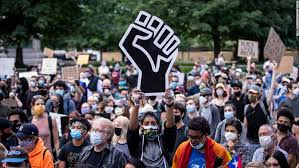Abstract:
India is a country which has an increasing rate in protest. The question which is mostly raised in this context is, who have the right to do so. The absence of expressed provisions which provides the right to protest makes the topic more confusing. There are also situations in which authority takes action against some and some are allowed to protest. This contradictions makes the topic more uncertain. This is the topic which we look in detail

“When injustice becomes law resistance becomes duty”
INTRODUCTION:
VOICE OF DISSENT:
There are also instances in which the people who express their own opinion were considered to be anti-nationals.[2] Justice Deepak Gupta ruled that “A dissenter is not an anti-national. The right to speech and expression is very important in case of a democratic country. As the powers are held by the people whom we have nominated and elected in order to ensure our needs and wants, it’s a citizen’s duty to keep a check on the works, to criticize, and to openly express the disregard to the activities. This will helps the country to maintain its balance and to make them aware that there are people who keeps an eye on them which will help them to work in a democratic manner.
[3]The right to speech and expression is also enshrined in various international laws like Article 19 of Universal Declaration of Human Rights, ICCPR Article 19, ICERD Article 5 this shows that how important is to express every ones opinion.
Even though the right to speech and expression is a fundamental right it also have some reasonable restrictions which is provided under Article 19 (2) of Indian Constitution. [4]It says that the speech can be restricted under the heads like, state security, public order, contempt of court, decency and morality, sovereignty and integrity of India and friendly relation with foreign state.
ASSOCIATE FOR RIGHTS:
But no one can use this rights arbitrarily. [5]Article 19 (4) keeps reasonable restrictions on the right to form association in order to ensure morality, public order, sovereignty or integrity.
[6]Universal Declaration of Human Rights in its Article 20 (1) speaks about the right to peacefully assemble and to associate. Similarly Article 21 and 22 of ICCPR, International Covenant on Economics, Social and Cultural Rights Article 8, General comment 25 of Human Rights Committee speaks about the same. This shows how important is the right to form association is to balance the stability of society and make commons a part of activities done by the government.
IS RIGHT TO PROTEST A FUNDAMENTAL RIGHT?
As any other fundamental right the government can also impose reasonable restrictions for these protest also which are laid down in different cases.
SIGNIFICANCE OF RIGHT TO PROTEST:
SHAHEEN BAGH PROTEST:
[7]In this case the Supreme Court clearly said that democracy and dissent goes hand-in-hand, all the demonstrations that taken by the people have absolute right. But these protest have to be taken in the designated place. Court also said that the right of commuter also have to be protected. As the protesters have the right, even the travelers have the right, so both have to be go together. That is ones right cannot be violated by others.
REASONABLE RESTRICTION ON PROTEST:
As other fundamental rights, there are reasonable restriction to right to protest also. It’s not an absolute one. While protesting the right of others shouldn’t be violated, the protest must be peaceful and without arms. If they violate the rules in such cases the government can impose restrictions to protest also.
Ramlila Maidan Incident v. Home Secretary, UOI
In this case Supreme Court stated that citizen has a fundamental right to assemble and peaceful protest. This cannot be taken away by an arbitrary executive or legislative action. So it’s understood that the right to protest, to publically question government and to make them answer is a fundamental political right which flows directly from Article 19 of Indian Constitution.
CONCLUSION:
The right to protest in a fundamental right which is guaranteed by virtue of Article 19. As the number of protest increasing by 55% every year, its important also to know that no one has the right to exercise this right arbitrarily. The state always have right to restrict this right in certain conditions and to maintain the right of others along with the protesters right. So it’s clear that everyone has the right to exercise their rights but no one has the right to take away the right of others.
REFERENCE
[1] https://amp.scroll.in/article/protest-rose-by-55-in-india
[2] https://lexlife.in/2020/03/02/expalined-freedom-of-speech-in-India/
[3] https://www.ohchr.org
[4] www.legalserviceindia.com
[5] https://indiankanoon.org/doc/
[6] https://www.ohchr.org
[7] https://www.thehindu.com/news/national/shaheen-bagh
Image Source
Author: Aleena C Alex, Bishop Cotton Women’s Christian Law College, Bangalore

